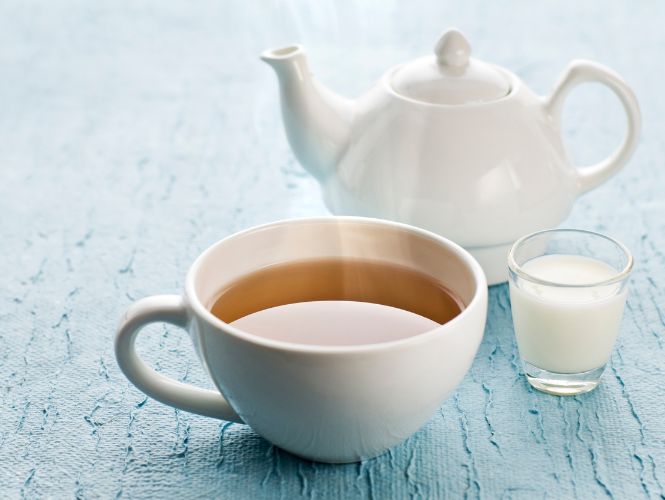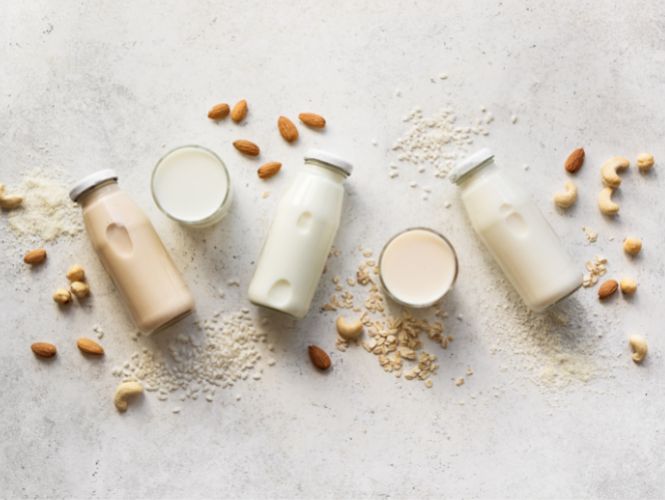How To Choose a Dairy-Free Milk Option for Teas and Coffees
Mar 19, 2023
When you first start a plant-based diet, everything feels overwhelming – there are so many meals and drinks that you used to have with meat, dairy or eggs in them! So how do you make substitutions, and what can you use instead? One area of concern is how to substitute the cow’s milk that you may have added to your tea or coffee. This article explains what you need to be aware of when looking for a dairy-free milk alternative, and the things to consider before choosing a plant-based milk alternative for your coffee or tea, so you can still have your tea or coffee and enjoy it.
The Backstory

I’ve never been much of a tea drinker and neither had my husband…that is, until we moved to the United Kingdom (UK) for a few years. For him, it was for school and for me it was for work. That’s when I started to have an appreciation for milk teas (yes, this was before I went plant-based!). I enjoyed the fact that meetings and tea always seemed to go hand-in-hand in our office – it’s just so much a part of the culture there. In the meantime, my husband – a Ph.D. student at the time – had gotten into the ritual of a cup of tea with milk each night. This is something he still continues till now. Of course, with changing to a plant-based diet, he needed to find an alternative…so after some trials and errors, he found a solution.
This is why I appreciate and understand the importance of milk in tea or coffee to some people and certain cultures. This is also the reason I want to devote this article to highlighting some options and considerations for those trying to find an acceptable alternative after moving to a plant-based diet.
Use a Plant-Based Milk Alternative

So, let’s talk about the options. First, of course, there is always the option of just omitting the cow’s milk or creamer from your beverage and drinking your tea or coffee black. But if you feel you need to have a milky tea or coffee combination, try this: use a plain unsweetened or vanilla-flavored unsweetened oat milk beverage as a substitute.
My husband found that this worked the best for him after trying a couple of different plant-based milk options such as almond milk, cashew milk, and soy milk. This is because oat milk tends to have a slightly thicker consistency that works well for such purposes. If you try this and want something different, feel free to experiment and try using one of the other plant-based milks instead.
In general, even if you are not eating a vegan or plant-based diet, you can consider using a plant-based milk alternative in your coffees or teas, as these would be lower in saturated fat and a healthier option than using full cream, regular half and half, or full-fat milk.
Other Dairy-Free Options
If the usual plant-based milk beverages don’t work for you, know that there are other options. Nowadays there are so many alternative plant-based milk creamers and other beverage options on the market. It just depends on where you live and what’s available. You are welcome to try some of these but there are a few important things to keep in mind about them:
There are multiple kinds of plant-based milk creamers using different bases such as oats, almonds, coconut, and pea-protein
- Many of these dairy-alternative or ‘half and half’ creamers contain oil as part of their ingredients, such as canola/rapeseed oil, sunflower oil or coconut oil. If it contains coconut oil, the creamer would be higher in saturated fat than products using other plant-based oils
- Look at the serving sizes: depending on how much you like to use in one cup of tea or coffee AND how many cups you have in a day, the calories can add up quite quickly! I have seen the calories range from 25 – 60 calories in just one tablespoon (15 mL). If it is 60 calories, that is even more than a tablespoon of oil (45 calories)!
- There are also ‘Barista’ style plant-based milk options available, e.g. Oatly Barista Edition Oat-Milk. These are designed to be thicker and have a foamier texture when made into a latte. The benefits are that the calories tend to be less (140 calories per 240mL cup for this Oatly brand) but vegetable oil can still be part of the ingredients (rapeseed oil is used for this Oatly product). Silk also has Barista milk options made from oats or almonds and these include sunflower oil in the ingredients.
If you are still not satisfied, know that there are also dry creamer powder products you can buy, made from ingredients like coconut oil, cashews or oats. Again, those made using coconut oil, coconut milk or coconut cream will be less healthy options as they are high in saturated fat. It is also prudent to check the ingredient lists of the products to see what other additives are included.
Non-Dairy Versus Dairy-Free

It is important to keep in mind that the terms ‘Non-Dairy’ and ‘Dairy-Free’ on product labels may not be equivalent. Historically, the U.S. Food and Drug Administration (FDA) has allowed products labeled as 'Non-Dairy' to contain 0.5% or less milk by weight, in the form of casein/caseinates (milk protein). The key takeaway? Always look at the ingredients list on a ‘Non-Dairy’ creamer or milk option that you are thinking of purchasing.
A Final Option
You can also make your own cashew, oat, almond milk and other plant-based creamers. It is actually easy to do so with just a few simple ingredients like steel-cut oats, water, salt, and a sweetener (if desired) like maple syrup or dates. You can also add a bit of vanilla extract for additional flavor.
NOTE: This article and the information presented within this article are accurate at the time of publishing. Please check the products' websites for the latest information on ingredients and nutritional facts as product formulations and packaging information may be subject to change without notice.



